Hans Aebi knows how wood processing works. As a master wood turner, he has five decades of experience in this. After apprenticeship and years of wandering, he successfully built up his own woodturning business from 1990. In doing so, he had to constantly adapt to the changing demand for wood products and evolve in modern manufacturing processes. This knowledge of working with CNC machines helped him when he started making alphorns in 2014. At the same time he got into alphorn blowing; in the meantime he plays with several formations.
Upon reaching retirement age, Hans sold his business. The new owners would like to continue the alphorn making business and have hired an 80% employee for this purpose. The goal is an annual output of 30-40 alphorns under the Aebi brand; resunar has recently taken over distribution. So Hans has set up the flying staff transfer. For the time being, however, he himself remains involved in the production, and he doesn’t give the impression that this will change in the near future. The horns are milled in Wilderswil on the modern machines and then finished near Herzogenbuchsee. This maintains the geographical proximity to the customer network.
His first alphorns were based on plans of unknown provenance. Hans fiddled with the design for more than half a year until the scale and intonation were right. He was helped by his experience as a trombonist and a friend who makes alphorns in the area. Recently, Hans has also been experimenting with an instrument maker on an alphorn with intonation close to equal temperament.
With a cup diameter of 23cm, the Aebi alphorns move close to the classic Bernese design. Hans builds wound and unwound alphorns in spruce, pine and Weymouth pine. He sources pine and spruce from the Engadine – both are cut as moonwood; the Weymouth pine comes from the Oberaargau region. The workmanship is impeccable. For the wrapped horns – instead of a ring – a few centimeters of unpeeled pedigree form the end to the cup. On the unwrapped horns, the Aebi logo is proudly stamped on the elegant brown bushings. Ring, barrel and feet are plain. The wall thickness of the Aebi alphorns is 7-7.5mm (Hans does not want to go below that); with a weight of 2.9-3.2kg they are in the middle range. Unlike most other alphorn makers, Hans lacquers his horns inside and out; a two-component lacquer is used on the inside to resist moisture, acid and nuclear radiation. Visually striking is the “kink” on the last 50 cm before the cup; at the transition to the middle section, the tube abruptly diverges at a somewhat larger angle – a consequence of the construction of the cup section, which, however, has no influence on the course of the bore.
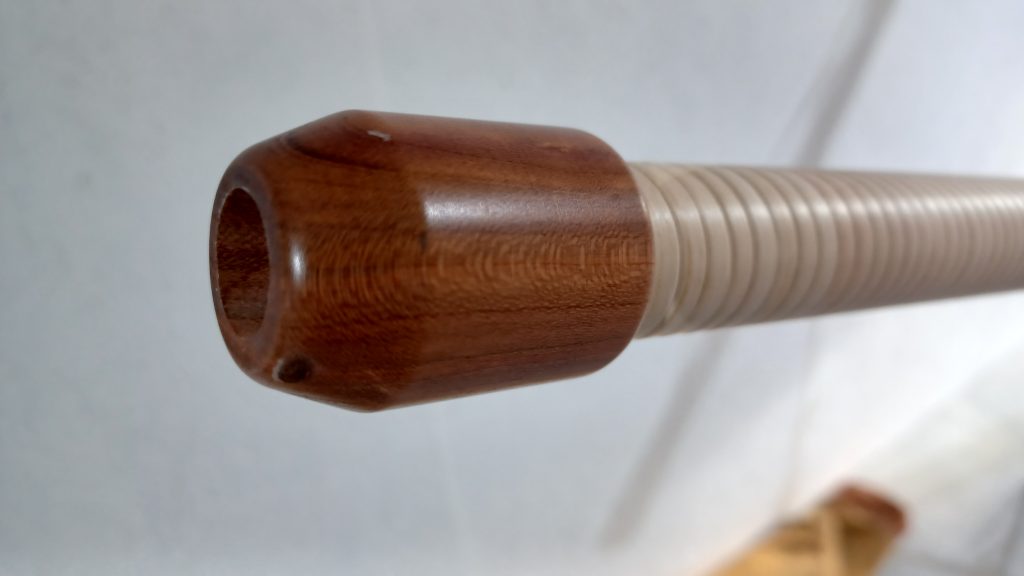
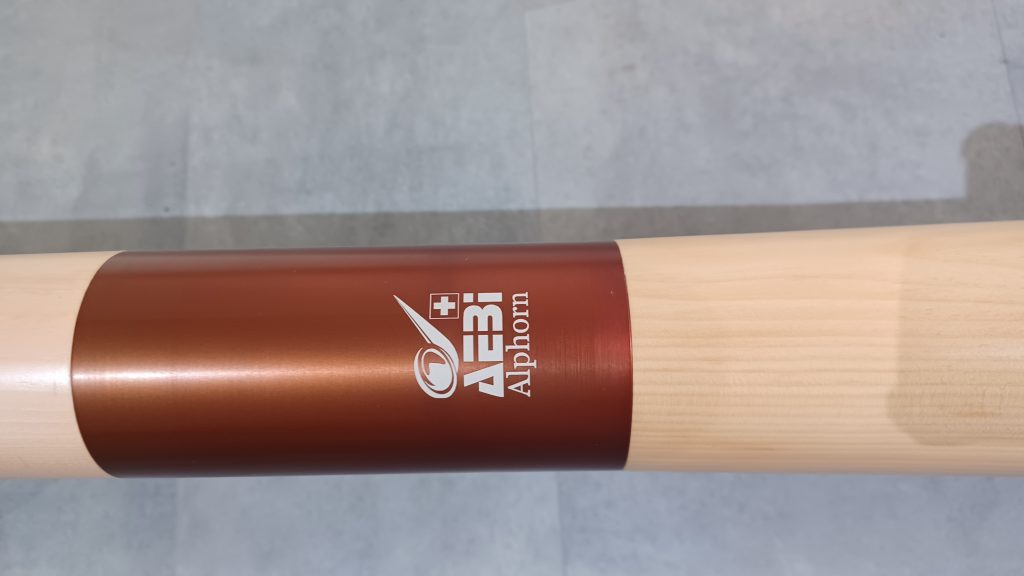
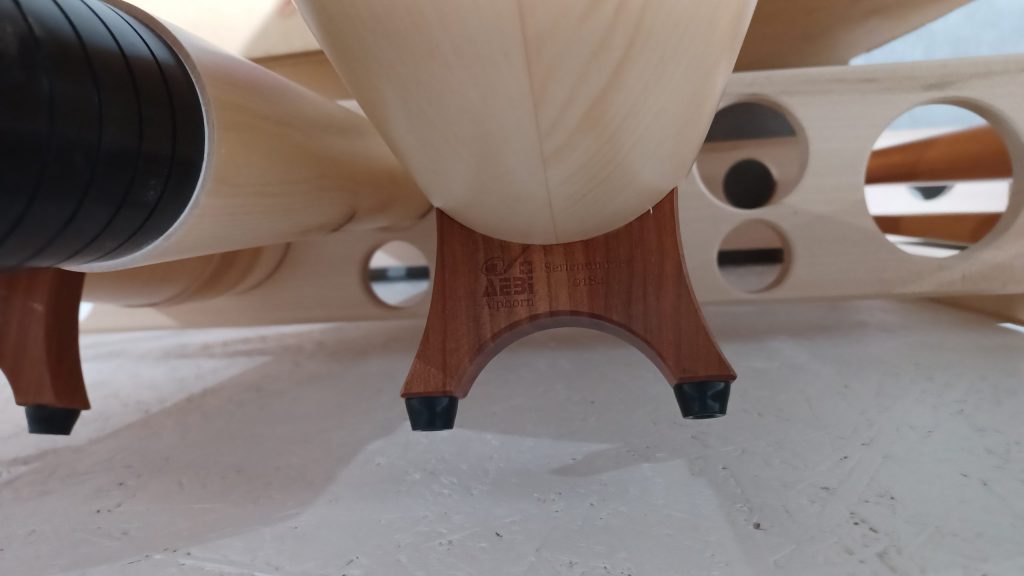
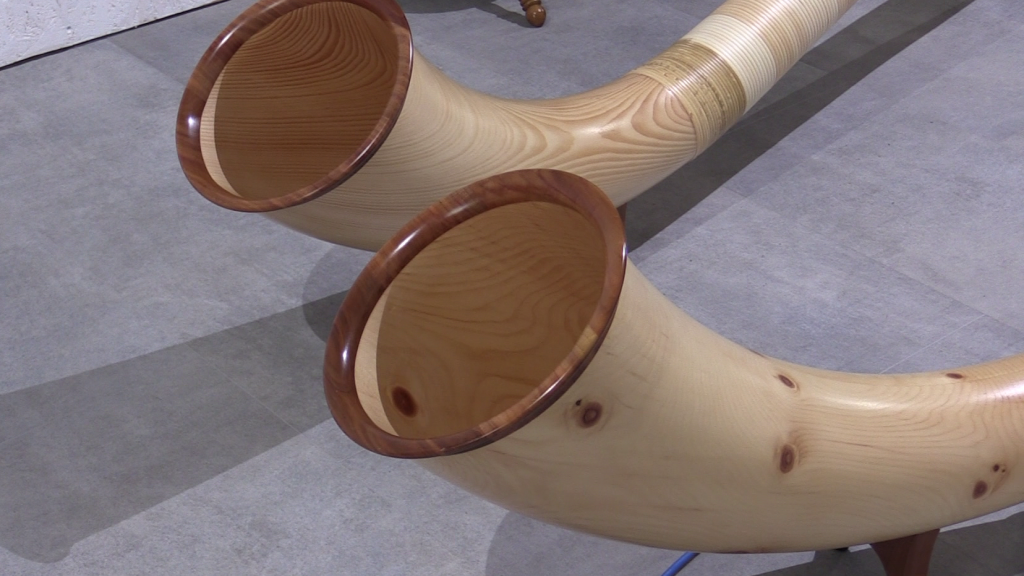
I was able to try on three different alphorns at Hans’: one wound alphorn in Weymouth pine and two alphorns in Arve – one wound and one unwound. The Weymouth horn was a spectacular feast for the eyes with its beautiful grain, but a bit dry in sound for my taste. The pine horns sound warmer – that’s why 80% of his customers choose this wood. In a direct comparison between two otherwise identical instruments, the effect of the winding was also striking: the unwound tube reacted much more sensitively to the smallest changes in embouchure. In fast passages or with triple reeds, such an alphorn has wings. Conversely, lyrical passages and sustained notes on the unwound alphorn require a high degree of control. The additional mass of the winding centers the sound and audibly improves the resonance of the harmonics.
During my visit, the temperature in the sample room was just under 12° Celsius; accordingly, all horns sounded too low. Hans is correct on a1=440Hz; the measured minus 25-30 Cts corresponds approximately to the expected temperature effect (rule of thumb 3 Cts per 1°C). The notes intonate together in a band of about +/- 10 Cts around the ideal values of the natural tone series – reasonably competent alphorn players will have no problem with the intonation. The harmonics are nicely distributed, not quite as brilliant compared to a horn in spruce. In dynamics, the three horns differ clearly from each other – the coiled Arven horn showed the most balance between pianissimo and fortissimo.
The price of a 3-part Aebi Alphorn is CHF 2,800-3,200. In addition, there is a bag (375 CHF) and mouthpiece (98 CHF). If you want to play in F as well as the standard F# tuning, you can buy an intermediate piece or a separate hand tube. Hans usually has 2-3 alphorns in stock – if you want an alphorn spontaneously, you will find it with him. He is also often on site with alphorns at regional yodeling festivals. Alternatively, you can buy Aebi alphorns from resunar.
Conclusion: Very cleanly processed instruments. Sound and response depending on the design variant – of the horns tested, I liked the wound Arven horn best. It is hoped that the staff handover with the new owners will continue to work harmoniously without any discord.
Here are a few more impressions:
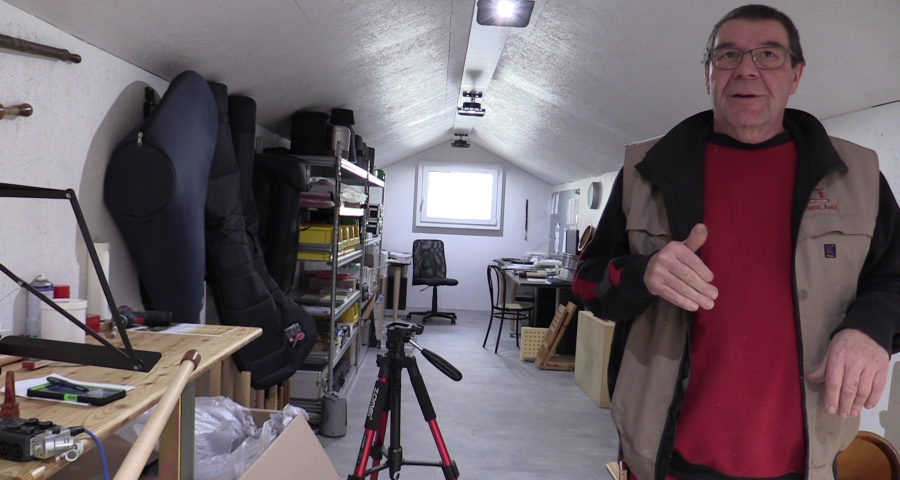
Leave a Reply